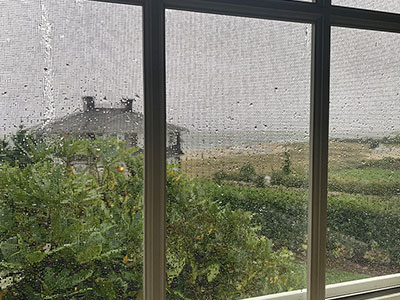Chatham Translation Symposium 2021: Notes from Shore
 The second Chatham Translation Symposium convened October 3-5, 2021 and featured 11 in-person participants, 4 additional presenters convening with us remotely, and a number of guests returning virtually from our class of 2019.
The second Chatham Translation Symposium convened October 3-5, 2021 and featured 11 in-person participants, 4 additional presenters convening with us remotely, and a number of guests returning virtually from our class of 2019.
The Symposium opened with Mark Lipovetsky of Columbia University discussing Russian literary trends—especially of the last hundred years—and the huge range of opportunities for new translations of notable authors whose works have only received minimal treatment in English, fallen out of print, or gone untranslated altogether.
Photos by Irina Mashinski
Participants observed that the current norm for the production of new translations is an informal system of offer, demand, and commission. The group discussed how a greater degree of coordination could result in translators and publishers agreeing more readily on specific titles and projects to translate and contemplated the forms such collaboration could take.
In a special video roundtable featuring translator Robert Chandler and translator and Los Angeles Review of Books editor-in-chief Boris Dralyuk, the process of collecting and compiling works for publication was front-of-mind. The importance of anthologies, journals, and miscellanies in translation was emphasized, especially for teaching purposes. Translation and publication of judicious and representative selections was seen as a goal for some of the aforementioned “untranslated.” This is especially true where those lacunae correspond to categories of genre or theme: for instance, the form of “in-between” (promezhutochnaya) prose, high Socialist Realism, and major types of genre fiction.
The Symposium celebrated the Russian Library, a project of Columbia University Press supported by Read Russia, which celebrated the publication of the 25th book in the series in 2021. The series has been extensively reviewed in the anglophone literary press, as have the publications of New York Review Books, led by Edwin Frank, who reflected at the Symposium on the two-decade history of his NYRB work with Russian literature. Future possibilities for the Russian Library itself were actively discussed.
Edward Kasinec of the Hoover Institution demonstrated how the Russian Library series, besides garnering the attention of reviewers and readers, has obtained strong representation in the library collections of the English-speaking world as well as globally where significant library holdings in English are catalogued. His review of sales and sales potential for translated works generated much discussion.
Seminars at the 2021 Symposium also focused on the qualities that make the best translations, and the shifting patterns of these preferences among translatorial schools and over the decades. Duke University’s Carol Apollonio led a lively discussion about translation choices and preferences, making use of the example of War and Peace, available in a dozen extant English translations, many of them extremely widely-read.
The craft of good translation was put to the test with a text excerpt chosen by NYU’s Maya Vinokour from the 20th-century writer Pavel Zaltsman, which we collectively translated in workshop format, discussing possible renderings and outcomes. This process activated the group’s varied linguistic talents, bringing to life the harmony of inspiration, aspiration, and erudition that underlies the best translation work. Translation of poetry was especially emphasised in Irina Mashinski’s discussion of linguistic rhythm and the intractable problem that it poses for translators, who are called upon to transfigure modes of making sense as much as meaning itself.
Besides the literary qualities of the best translations, Matvei Yankelevich urged us to consider the interpretive aspects of translation practice, which can lurk behind the tendency to speak of translations in terms of their “fidelity to sound or to sense” and in terms such as loss and gain, which work to obscure moral and political stakes. The history of the Cold War, which pervasively influenced the culture of Russian-English literary translation as much as it did the respective trajectories of Russophone and Anglophone literature, was explored in depth by Yasha Klots of Hunter College. The group had occasion to reflect on how the narrative of the “evil empire” both raised the stakes for translating Russian literature and strongly influenced editorial and translatorial decisions, in ways that continue to resonate. Columbia University’s Max Lawton discussed how translations traffic in brands and stereotypes and how best to negotiate with the cultural expectations of the Anglophone reader—a conversation that drew on the experience shared by many presenters of teaching Russian literature to uninitiated but often eager and open-minded students.

Photos by Irina Mashinski
Next steps:
A variety of media possibilities were contemplated for the promotion of translations: links with cinema and the performing arts can be used to build the audience of Russian literature, especially in realms where names like Prokofiev, Chekhov, Baryshnikov, and Tarkovsky are synonymous with creative genius. Though the audience of such artists doubtless already includes devotees of Russian literature, they also represent exciting and intuitive spaces in which the newest literary translations from Russian could be promoted. The same was said of making connections to popular nonfiction in politics and history, important Anglophone publishing markets where Russia is widely discussed, and where curious new readers might be found for belles lettres. Dramatic readings and other performances that could attract well-known presenters and participants were discussed as a path to generating interest in Russian literature among current and future readers. Anniversary occasions such as Dostoevsky’s bicentennial this year were highlighted as occasions to make a splash, including in collaboration with academic societies.
In the sonic realm—never far from the written page in Russian culture—it was proposed that titles should whenever possible be jointly released in audiobook formats. Podcasts on Russian literature and culture were seen as a way of informing listener-readers about new titles, and it was suggested that if such podcasts do not already exist, then they will have to be invented.
The dream of an American analog to London’s Pushkin House—cherished by many who met at the inaugural Chatham Translation Symposium—was once again discussed, with the idea that Russian culture should have a permanent base of operations and events, perhaps located in New York City, such as German culture enjoys at the Goethe House. We discussed the possibility of collaborating with existing cultural institutions (NYPL, CUNY, etc.) to establish an increasingly regular physical presence to host a wide array of events, in a manner designed to highlight the importance of literary culture.
The work of Read Russia moving forward will include exploring more media—online courses, podcasts, hybrid events—and more online activity generally during a time of decreased travel and assembly. Plans include assembling a Read Russia Media Advisory Council in 2022 and fostering collegial coordination and discussion among translators, publishers, and especially leading funders of translation work. Read Russia hopes to continue growing the tradition of the Chatham Translation Symposium and may bring the format of the Symposium on the road in 2022 before returning to Chatham again in 2023. We continue to reel in ideas and suggestions for participants and themes weeks after the October 2021 event and they are welcome from alumni and every reader far and wide.
With gratitude,
Geordie Kenyon Sinclair
Peter B. Kaufman
